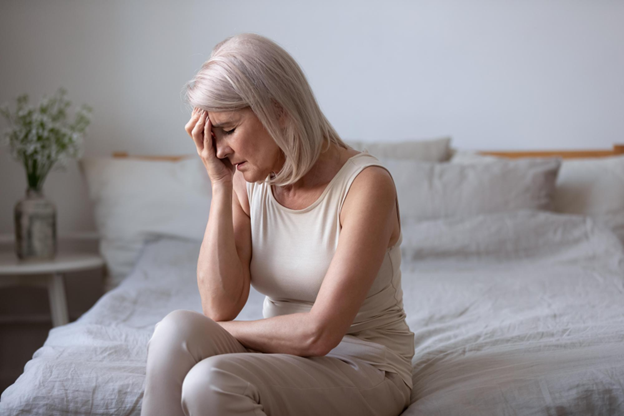Introduction:
Menopause is a significant phase in every woman’s life, marking the end of her reproductive years. It is a natural biological process that typically occurs around the age of 50, but the transition can begin earlier or later for some women. Menopause affects a woman’s hormones, menstrual cycles, and physical and emotional well-being. In this blog, we will dive deep into what menopause is, its stages, symptoms, and how to manage this life stage effectively.
What is Menopause?
Menopause is defined as the point in time when a woman has not had a menstrual period for 12 consecutive months. The ovaries stop producing eggs, and the body’s levels of estrogen and progesterone drop significantly. This results in the end of menstruation and the ability to become pregnant naturally.
There are different stages of menopause:
Perimenopause: This phase begins several years before menopause, typically around the age of 40, and can last up to 4 years. During this period, women may experience irregular periods and begin to notice some menopausal symptoms.
Menopause: This is the point when a woman has gone 12 months without a period.
Postmenopause: This stage occurs after menopause and continues for the rest of a woman’s life. Symptoms like hot flashes and night sweats usually ease after this phase, but long-term health changes related to menopause may occur.
Common Symptoms of Menopause
The hormonal changes that happen during menopause can cause a wide range of symptoms. These can be both physical and emotional, varying from woman to woman. Here are the most common symptoms:
- Hot Flashes: Sudden feelings of warmth, typically over the upper body, often accompanied by sweating and flushing. Hot flashes can last anywhere from a few seconds to several minutes.
- Night Sweats: Hot flashes that occur during sleep, often disrupting rest and leading to sleep difficulties.
- Irregular Periods: As the ovaries produce less estrogen, the menstrual cycle can become irregular, with some months having heavier or lighter periods or no period at all.
- Sleep Disturbances: Hormonal changes can disrupt sleep patterns, leading to insomnia or disturbed sleep.
- Mood Swings: Fluctuations in hormone levels can lead to feelings of irritability, sadness, or anxiety.
- Vaginal Dryness: Reduced estrogen can affect the vaginal tissues, causing dryness, discomfort during intercourse, and increased risk of urinary tract infections.
- Decreased Libido: Many women notice a decrease in sexual desire during menopause, often due to hormonal imbalances and vaginal dryness.
Managing Menopause Symptoms
Menopause may present challenges, but there are numerous strategies available to manage the symptoms and improve quality of life. Let’s explore some of the most effective ways to deal with menopause:
Lifestyle Changes:
Diet: Eating a well-balanced diet rich in fruits, vegetables, whole grains, and lean protein can help balance hormones and support overall health. Foods high in calcium and vitamin D are particularly important for bone health, as menopause increases the risk of osteoporosis.
Exercise: Regular physical activity can help improve mood, manage weight, reduce hot flashes, and improve sleep. Weight-bearing exercises like walking, jogging, and strength training are especially important for bone health.
Stress Management: Practicing relaxation techniques such as yoga, meditation, deep breathing, or mindfulness can reduce stress and help manage mood swings. Regular physical activity also helps to release endorphins, which are natural mood lifters.
Medical Treatments:
Hormone Replacement Therapy (HRT): HRT is one of the most effective treatments for relieving menopausal symptoms, particularly hot flashes and night sweats. It involves replacing the hormones that the ovaries no longer produce with synthetic hormones. However, HRT is not suitable for everyone, especially those with a history of certain health conditions like breast cancer, blood clots, or heart disease.
Non-hormonal Treatments: For women who cannot or prefer not to take HRT, other medications can help manage symptoms. These may include selective serotonin reuptake inhibitors (SSRIs) or serotonin-norepinephrine reuptake inhibitors (SNRIs) for mood swings and hot flashes, or vaginal lubricants and moisturizers for vaginal dryness.
Alternative Therapies: Some women find relief with alternative treatments such as acupuncture, herbal supplements (like black cohosh or soy isoflavones), and lifestyle changes. However, it is important to consult a healthcare provider before starting any alternative treatments.
Bone and Heart Health: After menopause, women experience a higher risk of developing osteoporosis and heart disease due to the drop in estrogen levels. Ensuring you have adequate calcium and vitamin D in your diet and exercising regularly can help reduce these risks.
Bone Health: Include weight-bearing exercises and a diet rich in calcium (dairy, leafy greens) and vitamin D (sunlight, fortified foods) to support bone density.
Heart Health: Since menopause can increase the risk of heart disease, maintaining a healthy weight, not smoking, and keeping cholesterol and blood pressure in check are important steps in protecting your cardiovascular health.
Emotional and Psychological Well-being During Menopause
The emotional changes that accompany menopause can sometimes be more challenging than the physical symptoms. These changes are linked to fluctuations in hormone levels but can also be influenced by lifestyle factors such as stress, family dynamics, and aging concerns. Women going through menopause may feel anxious, depressed, or less confident about their bodies. It’s essential to address these feelings and seek help when necessary.
Psychological Support: Seeking counseling or therapy can help manage stress, anxiety, or depression. Support groups, both in-person and online, can also provide emotional support from others going through similar experiences.
Open Communication: It’s important to talk openly with partners, family, and friends about the emotional and physical challenges of menopause. Understanding and support from loved ones can make a big difference.
Conclusion:
Menopause is a natural transition in every woman’s life, but that doesn’t mean it should be endured in silence. While the physical and emotional symptoms may be overwhelming, there are many ways to manage and thrive during this phase. Whether through lifestyle changes, medical treatments, or emotional support, menopause can be a time of renewal and empowerment. Consulting with your healthcare provider can help you navigate this transition and take proactive steps toward better health and well-being.
Consult us today at Sri Lakshmi Hospital for expert guidance!

